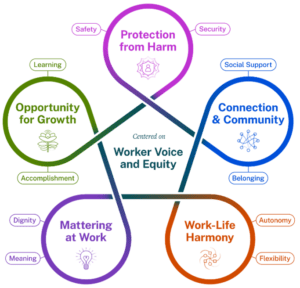
How work can be a proactive “engine” of employee well-being
Well-being at work is a hot topic, and with good reason. Whilst it was receiving increased attention well before Covid-19 began, the pandemic has expanded and accelerated interest in the role work plays in individuals’ physical and mental health.
The potential harmful impacts of work for well-being are well known. Work-related stress is common, with significant impacts for productivity. According to Gallup, 41% of UK workers experience high stress on a daily basis, and the Health and Safety Executive reports that 17 million work-days were lost due to stress, depression and anxiety in 2021/22. Frequent causes of work-related stress include high volumes of work, time pressures, challenging relationships and job insecurity.
Whilst a moderate amount of stress is healthy – and can even be beneficial, when the stress is significant and sustained it can lead to physical and mental health issues ranging from the fairly mild (e.g., headaches, fatigue and poor sleep) to the very serious (cardiovascular disease, a weakened immune system, and depression). Stress can also impact on work performance, with studies showing that it can reduce an individual’s level of engagement and productivity and increase absenteeism and intention to quit. Moreover, burnout can occur when stress levels repeatedly exceed someone’s ability to cope.
Many organisations have started to play their part in reducing well-being risks for their people. Good employers are likely to provide access to Employee Assistance Programmes and may also support colleagues to train and act as Mental Health First Aiders. Some employers seek to improve their people’s well-being by offering additional flexibility around working patterns or locations, or through access to gyms and mindfulness apps. Slowly but surely, talking about stress and mental health is becoming less of a taboo in many workplaces.
But what about the potential upsides of work for well-being?
Work can also be very good for our health. As well as enabling us to financially support ourselves and our families, it can also give a sense of meaning and purpose, enable personal development and growth, and provide a sense of community and belonging.
So, is the role of organisations just to make work less harmful for its people? Or can organisational culture and ways of working actually support and improve well-being?
Dr Vivek Murthy, the United States’ Surgeon General, argues that workplaces can actively help to improve health outcomes, as well as reducing or mitigating any harm. In fact, he described work and workplaces as potential “engines of mental health and well-being”. Dr Murthy has recently released a framework for Workplace Mental Health and Well-being. In this framework, he describes how work can be an asset for well-being, and how organisations can – and should – take steps to proactively improve the health of their people, not simply reduce or mitigate any potential negative effects of the work.
At Pecan Partnership, we support this view: work can proactively support employee well-being, and organisations and leaders have an important role to play.
Of course, this is not to say that well-being always trumps other organisational imperatives, such as productivity or profitability. On the contrary, by creating an organisational culture in which health and well-being can flourish, many organisations find that their other KPIs improve as well. When people have good well-being, they are likely to engage and flourish more at work: the two factors can be mutually reinforcing. Indeed, Dr Murthy’s report includes several case-studies showing examples of increased sales and revenue, and decreased costs and employee turnover, among other benefits.
Characteristics of a healthy workplace
Dr Murthy’s framework details five essential components of healthy workplaces:
- Protection from harm
- Connection and community
- Work-life harmony
- Mattering at work
- Opportunity for growth

By working with their people to create these conditions, organisations will begin to reimagine their workplaces as proactive engines of well-being.
1. Protection from Harm
The Protection from Harm component provides for the safety and security of employees. Specifically, the framework recommends prioritising physical and psychological safety, enabling adequate rest, normalising and supporting mental health, and fostering greater inclusion for all people.
2. Connection and Community
Under Connection and Community, the framework acknowledges the important role of social support and belonging at work. It recommends creating cultures of inclusion and belonging, cultivating trusted relationships, and fostering collaboration and teamwork.
3. Work-Life Harmony
The Work-Life Harmony part of the framework promotes the requirement for individuals to have autonomy and flexibility at work. This includes providing more autonomy over how the work is done, maximising the flexibility and predictability of schedules, increasing access to paid leave (a particular challenge in the US), and respecting boundaries between work and non-work time.
4. Mattering at Work
The Mattering at Work component provides for employees’ dignity and sense of meaning. The framework recommends that individuals are paid a living wage, be engaged in workplace decisions, experience and contribute to a culture of gratitude and recognition, and can connect their work with the organisation’s overall purpose or mission.
5. Opportunity for Growth
Finally, the Opportunity for Growth aspect deals with individuals’ requirement for learning and accomplishment. It recommends the provision of high-quality training and mentoring, clear and fair career pathways, and relevant, reciprocal feedback.
How Pecan’s work aligns to the framework
Pecan is supporting clients to create cultures in which both well-being and performance are not just prized, but can reinforce each other. Through behaviours, actions and decisions that support the elements above, we can support your organisation to be an engine of well-being, as well as high performance.
We’re already working to support our clients across many of the areas Dr. Murthy identified as supporting health and well-being at work:
- Values and behaviours: Through our culture audits, we’re helping organisations to identify the values and behaviours they need to achieve their organisational purpose, through dialogue about themes such as connection, community, autonomy and meaning.
- Engaged employees: Our People Engaged ChangeTM approach ensures that colleagues understand why key changes are required, and are involved in making them happen.
- Inclusion and belonging: Our inclusive culture health-checks and leadership appraisals are helping organisations to create diverse and inclusive cultures in which everyone is supported to do their best work and feels that they belong and truly matter.
- Psychological safety: We support leaders to role model the behaviours required to increase psychological safety. Teams which feel psychologically safe perform better, because people are able to speak openly, be creative, take moderate risks and learn from failure.
- Learning and growth: Our coaching programmes (often as part of a wider programme of cultural support) enable leaders and others to develop and grow, and accomplish challenging goals.
It’s clear to us that well-being and productivity aren’t mutually exclusive, in fact they actively support and feed each other. It’s also clear that organisations and leaders must play their part in making that happen. If you’d like to discuss how we can help your organisation, please get in touch.
